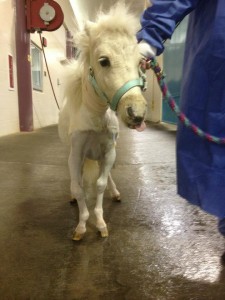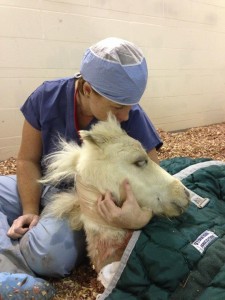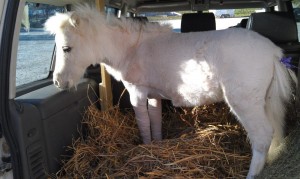
Before Bunny came to MU, she had severely deformed legs; her front legs angled and rotated outward instead of aligning straight.
When Shannon Reed first met Bunny, she wasn’t sure there was anything she could do. The 22-inch-tall, 70-pound miniature horse was born with severely deformed legs.
Casey Smith, founder of a nonprofit shelter for neglected equines, brought Bunny to MU after rescuing the mini from a large-production breeding farm, more accurately called a mill, Smith says.
“Bunny was not like any other horse i.”I’d ever met,” Smith remembers. Smith’s 7-year-old daughter suggested calling the bouncing beauty Bunny. “She had so much life for being this crippled tiny min
Smith carted Bunny to Columbia in the back of her SUV in October 2012 to see what — if anything — Reed could do for her.
“Normally, horses are born with their legs straight and their joints aligned to bear weight equally so every time they take a step there is a cushion,” says Reed, assistant teaching professor at the Equine Clinic in the MU College of Veterinary Medicine. “Instead of [Bunny’s front legs] just being angled, they also rotated so the entire bottom of her legs turned outward.”
Smith left the clinic for lunch thinking there wasn’t any help for Bunny, but when she returned a few hours later, Reed, DVM ’03, had consulted with a team of surgeons, including hospital director David Wilson and small animal orthopedic vet Derek Fox, PhD ’04. More similar to a dog in size, the team worked together to find the best solution, settling on a hybrid of procedures typically reserved for canines and of those done in horses.
“When I saw Bunny’s X-rays, I thought, ‘Wow, we have a lot of work to do,’ ” Reed recalls.
Working side by side with two other doctors and multiple students, Reed performed three surgeries to correct the bones in her legs.
“The repair we did is done on horses, but working on the ulna is something that’s done on dogs and cats,” Reed says.
During the three-hour procedure, her right leg, the more severely deformed of the two, was fused together to create a peg leg held together by 12 screws.
Bunny spent 11 days recovering in Columbia in a pen built just for her. Students got to calling it Bunny’s Clubhouse.
“It’s hard to describe,” Reed says, “but it was impossible not to go in there and bother her. Even the grouchiest couldn’t resist going into her stall.”
Bunny returned home with Smith to Blue Ridge Rescue in Blue Grass, Iowa, where she continues to recover. She was back on campus in January to get fitted for special shoes to adjust her hind legs.
“She couldn’t hold herself upright, and she was sinking in the back end,” Reed says. “We put her in special shoes that look like high heels. They’re like orthotics for people.”
Smith’s daughter calls them Bunny’s princess slippers.
“We’ve taken them off, and now she’s walking almost 100 percent normal,” Smith says. “When we took Bunny to MU, she could barely walk. Now she’s running at full speed.”
Reed adds: “She is going to live a pretty happy life in the pasture now.”
Story by Kelsey Allen
This article originally appeared in Mizzou Magazine, March 22, 2013





